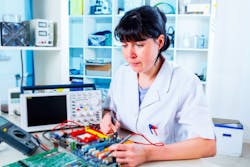This is a follow-up to my recent post, “7 Critical Things They Don’t Teach You in EE School.” Thanks to all of you who posted comments—great feedback on an always-hot topic. The responses covered a wide range of related topics, but there did seem to be some consensus. Here is my attempt to summarize the collective specific and implied opinions I received.
- The BSEE curricula are still valid. Basics still count and provide a solid base for future learning. A key goal of the BS program is in helping the student learn how to learn on one’s own.
Lambert858: We have to be constantly educating ourselves. Regardless of the performance of formal educational systems.
- There is not enough time in a BS degree program to cover everything an EE needs to know. This is especially true of newer and current technologies that come and go. And that includes the seven topics I listed.
Stanley3: Advocates seem to ignore the central fact that there’s not enough school time to learn it all.
- EE professors should be required to have some years of industry experience. To teach engineering, a professor should have experienced real-world design and development.
Sarathk: Most importantly most professors and lecturers have no good practical experience on those areas as they are just book readers or course preparing guys only.
- The MSEE degree should be the goal of all seeking an EE career. The extra year or so of college provides higher level and more specialized graduate and elective courses as well as a chance to do some real research and design in a thesis.
Jared Johnson: Bachelor’s degree is really the beginning of an engineer’s education. I [sic] anybody is serious about becoming an engineer, I strongly encourage them to seek at least a Master’s.
After I graduated with my Master’s I was very well prepared for the workplace and to be a contributing member of an engineering team.
- Some if not most of the critical topics I said were not covered are actually available in some schools as electives, graduate or continuing education courses. Some schools teach some or parts of the topics in regular required courses.
AWS1: I guess my 1981 BSEE from Purdue University included a pretty good course of study, as it included 5 of the 7 named subjects, just missing wireless and PWB [PCB] design.
- Most EEs do learn new technology on their own. All use existing sources like books, articles, webinars, manufacturer’s literature, and internet searches. Some rely on mentors or colleagues, college courses, or MOOCs. And they learn on the job by doing. Given the fast pace of technological change, EEs have no choice but to be self-taught.
Blue_Steel: I always viewed my college education as the way to learn EE theory and to go through EE “hazing” which is merely demonstrating my ability to learn. But the real EE learning today is done on the job.
Mccrpt: College is about learning how to learn. After all my boss often gave me a document and said build something that will do this. I did not have a book to tell me. I had to do research and learn how to do it.
- Does repair experience as a technician help learning engineering? Some say yes, others say no. Repair is not engineering. However, repair shows how products fail and does indicate how not to design something.
Jweir43: Some engineers never had to fix the crap that they designed..and that you would NEVER make that mistake.
Mccrpt: Doing repair teaches little for new development.
Pjgeneva: Repair teaches the basics. You can’t fix what you can’t understand.
- Do employers really know what EEs know or can do? There is some evidence to show that hiring managers and HR types do not really have a grasp of the actual extent of an EE’s capabilities. They often wrongly hire engineers for technician work, indicating they do not know the difference between what engineers know and technicians know. And do hiring people know of the BS in engineering technology degree? BSET grads also work as engineers, but their curriculum is less theoretical and more practical than a BSEE curriculum, and they typically get more hands-on and lab instruction. They are applied engineers.
Jared Johnson: For instance, after I graduated with my Master’s in 2010, I shockingly found many employers seeking engineers with 10 years experience in Le [sic]. However, what is considered LTE is release 8 of the 3GPP standard which was released in 2008!!!
Stanley37: I’m a big fan of well-run engineering technology curricula.
- I left out some important topics in my critical list.
Kldimond: So what are truly the basics? I define engineering as designing a system. Yet then we find that engineering school don’t teach that…not until you swing back around for a Masters.
User-451062: One area of electronics you left out was audio, or sound recording, processing, and reproduction.
Starbase435: Based on those [comments] collectively, an eighth “must add” point of order, schools need to cultivate better is the ability to THINK and DO independently of the technology…
- One final relevant thought.
Lambert858: Good conclusion to article. Though it doesn’t address an engineer’s “high[half?] life”. Time required to pass before 50% of an engineer’s knowledge base becomes obsolete. Last time I read any on this subject, it was estimated to be ~5 years.
My observation is that you EEs out there actually know the real impact of EE education since you have experienced it. I just wish college professors and deans would read this blog and all these relevant comments. And do something about it.
Looking for parts? Go to SourceESB.

